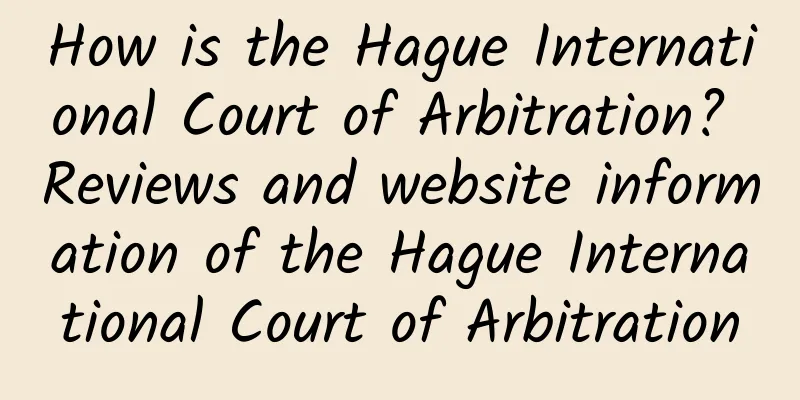How is the Hague International Court of Arbitration? Reviews and website information of the Hague International Court of Arbitration

|
What is the website of the Hague International Court of Arbitration? The Hague International Court of Arbitration (PCA) is an intergovernmental international organization established in 1899 and headquartered in The Hague. The Hague International Court of Arbitration is different from the traditional court, but an organizer to resolve conflicts between member states. At the same time, the Hague International Court of Arbitration is also different from the Hague International Court of Justice, which is one of the United Nations agencies. Website: www.pca-cpa.org The Hague International Court of Arbitration: an authority on international dispute resolutionThe Permanent Court of Arbitration (PCA) is an intergovernmental international organization with a long history and extensive influence. Since its establishment in 1899, the PCA has been committed to resolving international disputes through peaceful means and has become an authoritative arbitration institution recognized by the international community. This article will explore the origin, functions, operating mechanism and important position of the PCA in the field of international law. 1. The Origin and Development of the Hague International Court of ArbitrationThe establishment of the Hague International Court of Arbitration can be traced back to the first Hague Peace Conference in 1899. This conference was initiated by Russian Tsar Nicholas II and aimed at resolving international disputes through peaceful means and avoiding war. The conference adopted the Convention on the Pacific Settlement of International Disputes and decided to establish a permanent court of arbitration. In 1907, the Second Hague Peace Conference revised the convention and further improved the organizational structure and operation mechanism of the PCA. Since then, the PCA has gradually developed into an important platform for the international community to resolve disputes. Over time, the functions of the PCA have been expanding. It not only handles disputes between states, but also begins to accept disputes between states and other entities (such as international organizations and private companies). This expansion reflects the continuous development of international law and the important position of the PCA in the international community. 2. PCA’s Organizational Structure and Operational MechanismThe organizational structure of PCA includes the following main parts:
The operating mechanism of PCA mainly includes the following steps:
The decision of the PCA is final and cannot be appealed unless otherwise agreed by the parties. This mechanism ensures the efficiency and authority of dispute resolution. III. Differences between the PCA and other international judicial institutionsThe PCA and the International Court of Justice (ICJ) are two different international judicial institutions. Although they are both located in The Hague, they have significant differences in their nature, functions and operations.
In addition, the PCA is different from other international arbitration institutions such as the International Centre for Settlement of Investment Disputes (ICSID). The uniqueness of the PCA lies in its long history, broad member base and flexible case handling mechanism. IV. The Important Position of PCA in the Field of International LawPCA plays an indispensable role in the field of international law, which is mainly reflected in the following aspects:
In recent years, the number and types of cases handled by the PCA have continued to increase, reflecting the international community's trust and reliance on the PCA. From territorial disputes to investment disputes, from maritime delimitation to environmental protection, the PCA's rulings have had a profound impact on the development of international law. 5. Challenges and future development of PCAAlthough the PCA has made significant achievements in the field of international law, it also faces several challenges:
Looking ahead, the PCA will continue to play an important role in the field of international law. With the continuous development of the international community, the PCA may be reformed and improved in the following aspects:
VI. PCA and China’s RelationshipChina is one of the founding members of the PCA and has maintained a good cooperative relationship with the PCA for a long time. In recent years, as China's influence in international affairs continues to expand, the cooperation between China and the PCA has become increasingly close. China actively participates in various PCA activities, including:
At the same time, PCA has also carried out a series of activities in China, such as setting up an office in Beijing and cooperating with Chinese universities to hold international law seminars, etc. These measures have not only strengthened the cooperation between China and PCA, but also promoted the cultivation of international law talents in China. VII. PCA Typical Case AnalysisHere are some representative cases handled by PCA:
These cases not only demonstrate the important role of the PCA in international dispute settlement, but also reflect the complexity and challenges of international law. 8. PCA’s Contribution to the International Rule of LawPCA's contribution to international rule of law is mainly reflected in the following aspects:
In short, as an important platform for international dispute resolution, the PCA plays an irreplaceable role in the construction of international rule of law. With the continuous development of the international community, the PCA will continue to be committed to resolving international disputes through peaceful means, promoting the progress of international law, and contributing to building a more just and reasonable international order. |
>>: What is Mattel? Mattel reviews and website information
Recommend
The efficacy and function of Huoshan Dendrobium flower How to eat Huoshan Dendrobium flower
Huoshan Dendrobium is a wild herb that grows betw...
Cultivation methods and precautions of small potted Mingyue
Mingyue is very popular now. Its appearance is li...
How is Real Mallorca Football Club? Real Mallorca Football Club Reviews and Website Information
What is the website of Real Mallorca Football Club...
Ingredients and cooking methods for eggplant with sauce
Few people may have eaten the eggplant with sauce...
Camu berry benefits and effects
There are not many people in China who really kno...
How to make delicious Sargassum
Sargassum, also known as seaweed or live barley, ...
The benefits of concentrated roxburgh juice
Seabuckthorn is a natural wild fruit that grows m...
Taro Pork Ribs Congee
It goes without saying that the 598 taro and pork...
Osmanthus tea
Osmanthus tea introduction Osmanthus tea is a sce...
How is SEW? SEW reviews and website information
What is SEW? SEW (SEW-Eurodrive) is a German manuf...
The nutritional value and efficacy of fish balls and the benefits of eating fish balls
Fish balls are a common food in the southern coas...
How is Vietnam Airlines? Vietnam Airlines Reviews and Website Information
What is Vietnam Airlines? Vietnam Airlines is the ...
The effects and functions of stewed cucumber with basil
The day before yesterday, the company’s restauran...
Is Strelitzia suitable for home cultivation? How to grow Strelitzia in winter
The shape of Strelitzia is very special, it looks...
What is "Baseball Hero" like? "Baseball Hero" review and website information
What is the website of "Touch"? "To...









